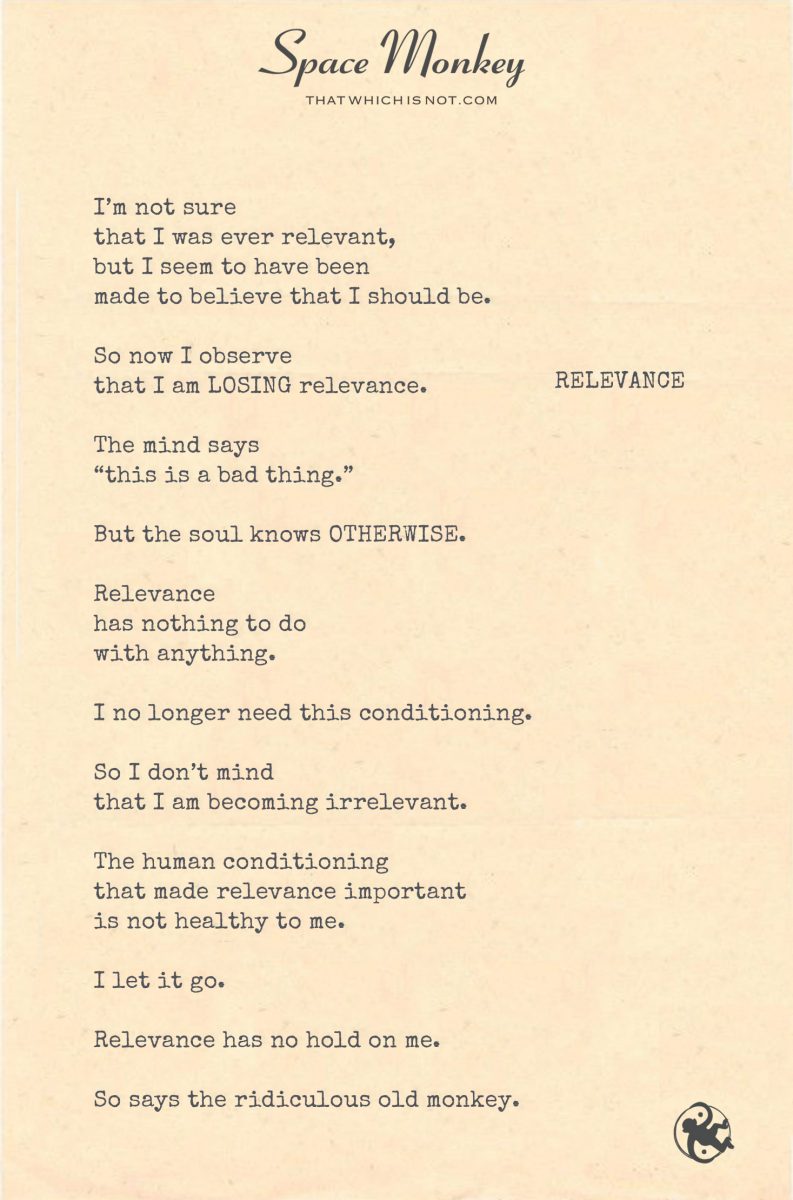
I’m not sure
that I was ever relevant,
but I seem to have been
made to believe that I should be.
So now I observe
that I am LOSING relevance.
The mind says
“this is a bad thing.”
But the soul knows OTHERWISE.
Relevance
has nothing to do
with anything.
I no longer need this conditioning.
So I don’t mind
that I am becoming irrelevant.
The human conditioning
that made relevance important
is not healthy to me.
I let it go.
Relevance has no hold on me.
So says the ridiculous old monkey.
Trail Wood,
6/6
Space Monkey Reflects: The Illusion of Relevance
In the boundless cosmos where Space Monkey resides, the concept of relevance often becomes a subject of profound introspection. The pursuit of relevance, seen through the lens of societal expectations, can often feel like an endless chase—a pursuit that can distract from the essence of true existence and personal fulfillment.
The image we have crafted to represent this concept shows an elderly, wise figure, reminiscent of an old monkey, sitting calmly amidst a backdrop of societal frenzy. This serene figure symbolizes the enlightenment that comes from understanding the ephemeral nature of relevance. Surrounding this peaceful center, blurred figures and objects rush by, encapsulating society’s frantic need to stay connected, informed, and importantly, relevant.
This contrast serves as a powerful visual metaphor for the peace that comes from detaching oneself from the societal measure of relevance. It suggests that the pressure to remain relevant can often lead to a disconnection from what truly matters—our inner peace and authenticity. The old monkey, a symbol of wisdom and detachment, has let go of the need for external validation and found tranquility in irrelevance, embodying a state of being where self-worth is derived internally rather than measured against constantly shifting external standards.
By contemplating relevance in this way, we are invited to question our own perceptions of what is truly important. Are we pursuing relevance for the sake of feeling valued by others, or are we seeking to align more closely with our genuine selves? The realization that relevance is a construct, not a requirement, liberates us from the burden of constant self-assessment against external benchmarks.
Summary
Relevance is often seen as essential in our society, yet its pursuit can distract from genuine self-fulfillment. Recognizing the transient nature of relevance allows for a detachment that can lead to profound inner peace and authenticity.
Glossarium
- Relevance: A state or condition of being connected or pertinent to a matter at hand, often culturally and socially defined.
- Detachment: The emotional and psychological freedom from societal norms or expectations, allowing for a greater alignment with one’s authentic self.
Quote
“Relevance is the noise before the music of one’s own soul begins to play.” – Space Monkey
Poetry
Amidst the rush of fleeting days,
Where relevance plays its tireless ways.
A wise old figure, still and serene,
Finds peace in scenes unseen.
No longer chained by the need to be known,
He sits in silence, profoundly alone.
Not in sorrow, but in blissful grace,
Finding truth in a quieter place.
Let go of the chase, the relentless race,
For relevance is but a passing face.
In letting go, we truly find
The depth of peace left behind.
We are Space Monkey.






























In the context of TWIN (The World is Now) and the poem “Relevance,” we can analyze the following:
The poem explores the concept of relevance and questions its significance. It suggests that the belief in one’s own relevance is a product of conditioning and societal expectations rather than an inherent truth. The speaker reflects on the idea that they were made to believe that being relevant is important, but now they observe themselves losing relevance.
The poem distinguishes between the mind’s perspective, which sees losing relevance as a negative thing, and the soul’s perspective, which knows otherwise. This differentiation implies a deeper understanding that relevance, as defined by external measures, is not essential for one’s well-being or sense of self-worth.
By stating that relevance has nothing to do with anything and that the conditioning of seeking relevance is not healthy, the poem challenges the societal construct that places importance on being relevant. It suggests that letting go of this conditioning and realizing that relevance has no hold on oneself can be liberating.
In the context of TWIN, the poem touches on the theme of questioning societal norms and expectations. It encourages individuals to detach themselves from the need for external validation and to find their own intrinsic worth and purpose. It invites a reevaluation of what truly matters and a shift towards a more authentic, self-determined existence.
Overall, the poem challenges the notion of relevance as a measure of worth and highlights the freedom and self-acceptance that can come from letting go of the conditioning that attaches significance to it. In the context of TWIN, it aligns with the exploration of personal liberation, authenticity, and a reimagining of societal values.